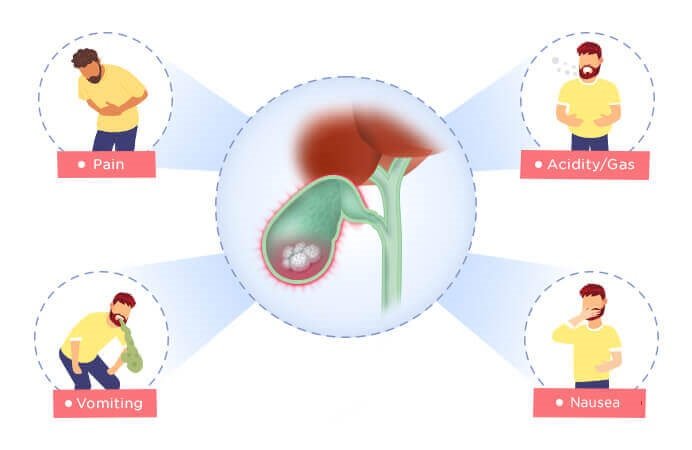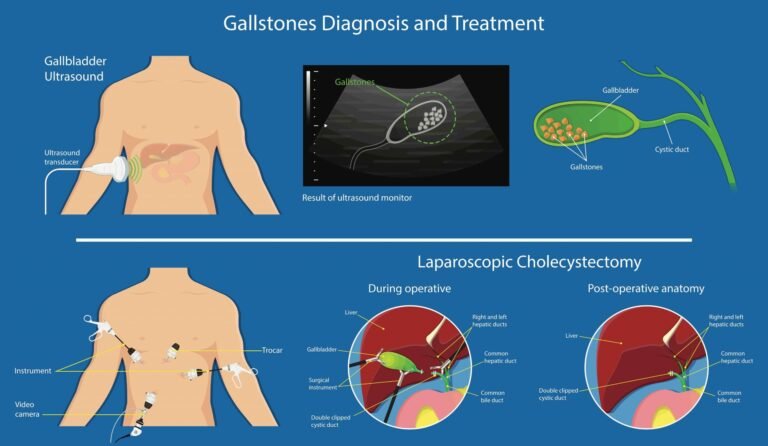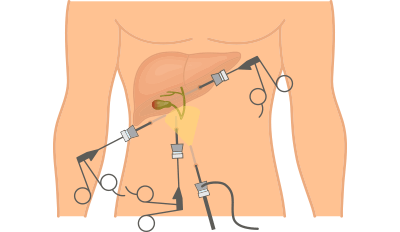Gall bladder stones (Cholelithiasis)
What is a Gall bladder?
Gall bladder is a balloon shaped pouch present at the base of liver. It is a storage organ for bile which is produced from the liver which helps in digestion of fat in food. Bile formed in the liver which goes along a tube called as the hepatic duct enters the gall bladder via cystic duct and gets stored. Whenever we eat food, bile from the gall bladder is pumped into the same duct and enters a a larger tube called as Common bile duct which is connects to the small intestine(Duodenum) below where it mixes in food and aids digestion.

What are Gall stones?
Bile is maintained in a liquid state by various factors like cholesterol, active lifestyle, hormones etc… When any of the factors change the bile starts forming crystals which form as stones.
Cholecystectomy:
Say goodbye to gallstones and discomfort with Laparoscopic Gall Bladder Surgery. This safe, minimally invasive Cholecystectomy technique allows quick recovery and lasting digestive relief from Gall Stone Surgery.
Symptoms
What are the symptoms of Galls stones?
The pain is the main sign could be in the abdomen or sometimes it may even extend till the chest, shoulder blade or arm. It may be accompanied by nausea or vomiting. Pain could last for about half an hour after a meal or continue for several hours. If the gall bladder is inflamed, the pain in the upper abdomen can be severe and the area may become extremely sensitive to touch. Some patients may experience uneasiness or bloating after a fatty meal. Sometimes, the stones may move from the gall bladder into the bile duct, which is the tube that connects the gall bladder with the upper part of small intestine called Duodenum. Patients with this condition could suffer from jaundice and high fever. In such cases, the patient needs to undergo an additional endoscopic removal of the stones that are lodged in the bile duct. Sometimes the stone cause blockade to the pancreas resulting in pancreatitis which is most dreaded complication of all.

Treatment
- Medical Management : Gallstones may be formed incidentally in routine health check-up ultrasound or imaging of abdomen for some other reason. When they are non-symptomatic, surgery is not needed except in certain conditions like a stone >3cm in diameter, Multiple stones, future surgery is not possible in an elderly or patient undergoing an abdominal surgery for other reasons, combined with another procedure. Where there is no pain or discomfort, surgery may not be required. The patient can continue to live a normal life with the stones in the body.
- Surgery Cholecystectomy: If gallstones cause symptoms, then they should be treated by removing the gall bladder along with the stones

Surgery
What kind of surgery is required for removal of the gall bladder?
- The gall bladder can be removed through open surgery or through laparoscopic/ keyhole surgery.
What is keyhole or laparoscopic surgery?
- Laparoscopic or Keyhole surgery is the modern way of surgery with minimal scars and early recovery. Small incisions of 5 to 10mm are made in the abdomen and a camera telescope is inserted into the abdomen. Gas is filled in the abdomen and all internal organs are visualized as a magnified image on a television. Long thin instruments are used to perform the surgery. Unlike open surgery where a large 5 to 10 cm incision is made which takes a long recovery period, keyhole surgery is less invasive resulting in shorter recovery with less pain. The risk of infections and complications are also reduced.

Common questions asked
- How soon after detecting the problem must I go in for a gall bladder surgery?
Not all gall stones need to under go surgery. Only gallstones which are symptomatic need to undergo at the earliest to avoid various complications as jaundice, Pancreatitis, etc.. - Can Gallstones be ‘flushed’ away?
Small gall stones less than 5mm usually gets flushed into the system and gets destroyed but bigger stones cannot be flushed because the exit from gall bladder is a tube with small diameter of 1 to 5mm. So if there is a large stone it will cause blockade and result in complications. - Can Gallstones be broken up using shockwaves?
Shockwaves are used for breaking kidney stones but many researchers have tried earlier for Gall stones and no evidence is available. - Is Surgery for gallstones is risky?
All surgeries carry a small risk and Gall bladder surgery has the same risk. - Can you lead a normal life without a gallbladder?
Gall bladder is only a storage organ and its does not have any function in production of bile. Post surgery patient may have a little difficulty in digesting fat but not always. Yes You can lead a normal life without a gall bladder. - Can we remove only the stones and leave the gall bladder?
The main problem is the gall bladder which forms the stones, so if we leave the gallbladder more stones will be formed so its better to remove the entire gallbladder. - Should I get it operated even though it is present for many years?
Gallstones as said earlier can be left alone if not symptomatic but when symptomatic or alogn with another abdominal surgery it can be removed. - Can we take Medications to destroy stones?
There are no medications to destroy gallstones but we can prevent it from forming new stones. - What are the complications of Gall bladder surgery if not done at the right time?
The most common complication is Pus in the gall bladder, Jaundice if the Common bile duct is blocked. Septicemia if the infection spreads, Pancreatitis which is the most dreaded one. - Can it be combined with any other abdominal surgery?
Yes it can be combined wiith other abdominal surgery if gall bladder needs to be removed. - Can surgery be done during pregnancy?
It is better to avoid surgery during pregnancy because of the surgical stress to the growing foetus. If emergency, then it must be done. Most of the evidence stated surgery in the 2nd trimester is safe. My personal advice is better to postpone surgery if gall stones are asymptoamtic - Can gallstones cause cancer?
The commonest Gall bladder cancer arises due to repeated inflammation of the gall bladder due to stones as evidence states. The modality of surgery changes if diagnosed as cancer.
